
April 2, 2025


Without a licensed tie-in to popular media, an action figure faces a challenge that is far more formidable than battling the forces of evil — the battle for the consumer’s dollar. Yet, a few independent action figure producers are emerging victorious despite the odds.
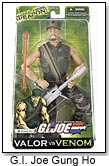 “Given a choice between Spider-Man and a toy no one has heard of, kids are going to take Spiderman,” contends Mike Leavey, marketing and sales coordinator for Diamond Select Toys, which manufactures licensed action figures. “Consumers are always looking for a name or brand that they recognize, whether it is soda, ice cream or toys.”
“Given a choice between Spider-Man and a toy no one has heard of, kids are going to take Spiderman,” contends Mike Leavey, marketing and sales coordinator for Diamond Select Toys, which manufactures licensed action figures. “Consumers are always looking for a name or brand that they recognize, whether it is soda, ice cream or toys.”
While licensed properties dominate, NPD Funworld reports that non-licensed characters make up about 18 percent of the $1.2 billion action-figure market. Military characters, such as perennial favorite G.I. Joe, represent a major category in the non-licensed segment. Other popular genres for non-licensed figures include fantasy-based characters. Toymakers succeed with non-licensed characters by zeroing in on these successful genres or by creating distinctive characters that make a connection with their intended audience.
Spawned from Imagination
One such company is McFarlane Toys. While the company’s Spawn action figures are based on founder Todd McFarlane’s own comic book creations, other lines have been developed independent of media tie-ins. 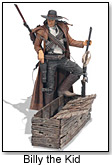
“McFarlane Toys has quite a history of non-licensed product, and it’s a vital part of our business,” McFarlane states. To maximize the success of these lines, McFarlane points out, the company tries to make “careful thematic choices that people will likely recognize and hopefully appreciate.”
For 2005, the company estimates it will have seven in-house lines. New this year are the addition of two lines to the McFarlane Dragons series, the entry of Twisted Fairy Tales as the fourth line in the McFarlane Monsters series, and two McFarlane Military lines. These figures have a high level of detail that appeals to collectors and hobbyists. 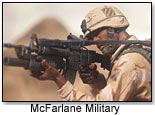
With 700,000 unique visitors per month to its Web site, McFarlane Toys receives feedback that helps validate the market for these products. “My companies really don’t do much traditional advertising or marketing,” McFarlane concedes. “It’s all done on a very grass-roots level, mostly online and through word-of-mouth.”
Creatures Full of Character
Starting from scratch, John Chandler created Splashdown Toys to showcase his whimsical lineup of monster-like figures called The Skrumps. Specialty toy stores on the West Coast – including Storyopolis in Los Angeles and Three Cheeky Monkeys in Santa Monica, Calif. – report robust sales of the unique figures. According to store managers and sales associates, they’re “eye-catching,” and “silly” – making them appealing to kids, parents and even adult collectors. Each Skrump comes with a 30-page storybook that helps establish its unique identity. Traits range from neurotic to sneaky-squeaky clean.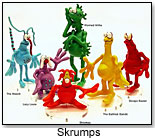
Steve Meynig, store manager for Tom’s Toys in Beverly Hills, Calif., says the line’s success has a lot to do with how well consumers identify with the characters’ personalities. “That’s the thrust of the Skrumps. People know somebody with that personality trait, and they can relate to it.”
Another distinctive feature of the Skrumps is that they are made of “urban vinyl,” a new trend in the action figure market. Urban vinyl allows for a more sculpture-like appearance than can be achieved with hard plastic.
In Chandler’s view, today’s independent artists have a better chance to break into the action figure market than ever before. They can show their stuff at industry shows, such as San Diego’s 36th Annual Comic-Con, and build their presence by developing an online community. In addition, small, niche toy companies that seek such artists are growing in number, working with a growing population of specialty toy shops, like Giant Robot, Kid Robot and Toy Tokyo, that are willing to carry their products.
“You don’t have to have a TV show or movie to succeed,” Chandler says. “Instead, success can be driven by the quality of the artwork.”
Personal Touch
Even more unique even than art-inspired action figures are one of a kind replicas crafted in the image of the consumer. That’s the appeal of the On Demand page at HeroBuilders.com. On this easy-to-use, interactive page, visitors choose the figure’s race, head, hair color, eye color and clothing. Orders are produced and shipped within 48 hours of submittal.
“It’s a huge success,” reports head toymaker Emil Vicale. “It’s been the number one visited page on our Web site for eight months. Kids especially love the interface.”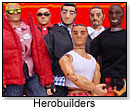
HeroBuilders got its start with political action figures and now has 25 characters, ranging from George W. Bush to Osama Bin Laden. Because they are public figures, no licensing is required. In addition, HeroBuilders offers custom action figures made to clients’ specifications. The company’s latest introduction is a line of provocative female action figures, Hotbox Figures, which represent HeroBuilders’ first foray into a retail packaged product. All of the company’s other lines are sold via its Web site.
Vicale concedes that selling action figures without a media tie-in is tough, but it can be done by putting a fresh spin on an existing idea and targeting an appropriate audience. “It all comes down to creativity and finding your niche.”
Read an update on Female Action Figures in Playzak.
Copyright © 2025 TDmonthly®, a division of TOYDIRECTORY.com®,
Inc.